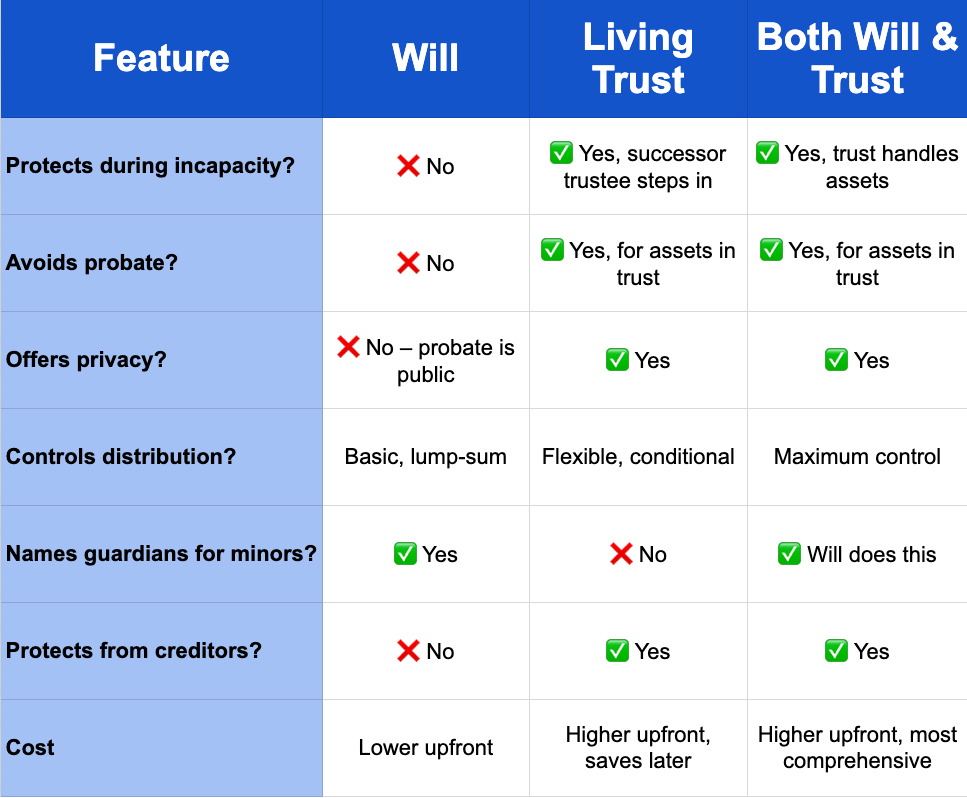Wills vs. Trusts: Which Is Right for Your Family in Colorado?
When it comes to estate planning, one of the most common questions I hear is: “Should I have a will or a trust?” Both tools serve important purposes, but the right choice depends on your family, your assets, and your goals.
Let’s break it down with two relatable Colorado family scenarios.
What Does Probate Cost in Colorado?
In Colorado, probate is generally simpler and less expensive than in many other states—but still not cheap. On average, probate fees and legal costs may range from $3,000–$6,000 or more, depending on the size and complexity of the estate and whether disputes arise. Many families prefer to avoid probate entirely to save time, money, and keep their financial information private.
Revocable Living Trust Scenario: Jane & Michael
Jane and Michael are an upper-middle-class couple with two young children and an estate size of about $1.5 million. Their assets include:
A family home in Colorado
A rental property in another state
Retirement accounts
Several bank accounts
What They Want
To avoid probate so their children receive their inheritance quickly and privately, and if minors, with the assistance of their guardians and trustee(s).
To avoid conservatorship for the children if their parents become incapacitated.
To control how and when their children receive their inheritance, such as in installments rather than a lump sum distribution.
To protect their children’s inheritance from creditors or divorce with the use of carefully drafted spendthrift trust language.
To manage property in multiple states without ancillary probate proceedings in a foreign state, such as Nebraska, etc..
How a Trust Helps Them
✔️ Avoids probate – Assets owned by the trust transfer without court approval, saving time and money.
✔️ Protects during incapacity – A successor trustee can immediately step in if Jane or Michael, or both become incapacitated and cannot manage finances.
✔️ Controls inheritance – Assets can be distributed in stages (e.g., part at age 25, the rest at 30) instead of all at once.
✔️ Safeguards assets – spendthrift trusts can protect beneficiaries from creditors.
✔️ Manages multi-state property – Their rental property in another state avoids expensive ancillary probate.
Simple Will Scenario: Maria & David
Maria and David have a more modest estate, valued under Colorado’s probate threshold, $86,000 in 2025. Their assets include:
A single-family home
A 401(k)
A checking account
Two minor children
What They Want
To legally nominate a guardian(s) for their children.
A simple, cost-effective way to distribute assets.
To leave everything to each other, with children as backup beneficiaries.
How a Will Helps Them
✔️ Names guardians – A will or other written document legally nominates guardians for minor children. A court order is still required to appoint the guardian(s). The guardian(s) who are nominated are given legal priority by the Court.
✔️ Keeps it simple – A will is less expensive upfront than a trust; however, the estate will still need to go through the probate process if assets are greater than the maximum small estate threshold, $86,000.00 in 2025
✔️ Directs distribution – Ensures assets transfer to the surviving spouse and then children.
✔️ Can include a trust later – A “testamentary trust” within the will can manage children’s inheritances until they reach adulthood or a higher age.
✔️ Acts as a safety net – If they also had a trust, a “pour-over will” would transfer any forgotten assets into the trust at death.
Wills vs. Trusts at a Glance
So, Which Should You Choose?
A will may be best if you want a simple, cost-effective way to name guardians and distribute assets.
A trust may be best if you want to avoid probate, protect against incapacity, or provide structured inheritances.
Many families benefit from having both: a trust for asset management and a will to cover guardianship and any assets not transferred into the trust.
Note that the beneficiary provisions in a trust also avoid probate for assets such as life insurance, retirement plans, and other assets. Bank Accounts can avoid probate if established as POD (Payable on Death Accounts).
Need to update your current estate planning? I can help with that too.
Final Thoughts
Estate planning isn’t just about money—it’s about protecting your family and making things easier for them when life changes. Whether you’re considering a will, a trust, or both, I can help you create a plan that fits your needs. Still not sure which one is right for you? You’re not alone and I can help. There is no one-size-fits-all. Custom estate planning is advisable.
📞 Call 720-408-5702 or schedule a free consultation online to start the conversation.

